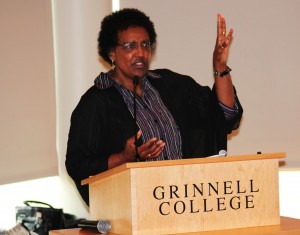Chinaphobia combatted through workshop
Scarlet & Black 2013-04-22
A group of students gathered Monday to participate in an intimate workshop about how to recognize and combat Chinaphobia, hosted by Kesho Scott, American Studies and Sociology, and Qianning Zhang ’13.
Chinaphobia, in its broadest sense, is racism against people with Chinese ancestry and constitutes a global phenomenon.
“[Chinaphobia] is driven by people’s fears—irrational fears—over what China might do or might not do,” Scott said. “[The workshop] was a quest for us to see that [Chinaphobia] functions as an ‘ism.’ It is a kind of racism towards people of Chinese descent, and it’s a global phenomenon.”
Zhang, Scott’s research assistant this semester, concurred.

Kesho Scott, American Studies and Sociology, spoke during a workshop concerning combatting Chinaphobia. Photograph by Greg Hinton.
“We don’t tolerate racism, sexism, etc. So why should we tolerate baseless attacks made on the Chinese? Contrary to the popular belief that Chinaphobia is not racism, anti-Chinese sentiment is essentially racism since many still conflate Asians with Chinese,” Zhang said.
The workshop, and Scott and Zhang’s semester-long research project, originally developed out of a conversation in one of Scott’s classes.
“I have been doing a project on the Chinese Diaspora and its history emerged when a student asked me ‘Where are the Chinese in the world and why are there so many Chinese in the continent of Africa today? Then another student said, ‘It’s a new form of colonization.’ So that small conversation led me to want to understand,” she said.
Scott and Zhang laid out a history of Chinaphobia in America, beginning with fears over Chinese immigration during the late 19th and early 20th century, concerns over cheap labor and unfair labor practices, and the some and the lasting Cold War divisions between communist and capitalist societies.
Contemporary Chinaphobia, Scott and Zhang argued, stems from Chinese ownership of some American debt and an inability to recognize continuing racism against Chinese-Americans.
“Now that they are our competitors, as an emerging capitalist country with a communist political regime, I began to notice this sort of backlash against China,” Scott said. “As China emerges as a world power, it’s increasing.”
The larger risk of not addressing Chinaphobia, both in the United States and abroad, could have profound impacts on the relationship between China, the United States and the wider world in the near future.
The most difficult obstacle to addressing Chinaphobia is getting community members to recognize and challenge Chinaphobia in their daily lives.
“We know it exists, we know it’s one of those soft power issues, the fact that we don’t talk about it, might mean we’re playing right into it,” Scott said. “When people do make Chinaphobic remarks, we don’t quite know how to handle it. … We all have to confront those limits in our human precision.”
The workshop was recorded, and is available on video at the AV Center or by getting in touch with Scott.